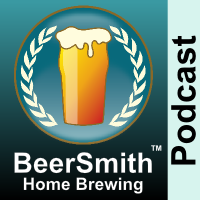Gordon Strong joins me for a discussion on German Lager beer styles and some tips for making the perfect lager.

Subscribe on iTunes to Audio version or Video version or Spotify or Google Play
Download the MP3 File– Right Click and Save As to download this mp3 file.
Topics in This Week’s Episode (47:30)
- This week I welcome Gordon Strong. Gordon Strong is the President of the Beer Judge Certification Program, its highest rated beer judge, and author of the books Modern Homebrew Recipes and Brewing Better Beer (Amazon affiliate links).
- We start with a short discussion of Gordon’s recent activities and trip to Brazil before the pandemic.
- We walk through some of the German beer styles including Pale Lagers, Malty German Lagers, Amber Lagers and Bocks.
- Gordon explains some of the common elements from each including flavor and ingredients.
- We then discuss some of the common elements in German lagers including the most common errors made when brewing them.
- Gordon explains why a two step German Lager mash is absolutely critical for getting the attenuation and body right in these styles.
- We talk about malty vs sweet malts and how you can improve your malt bill to get these styles right.
- We discuss the use of continental hops.
- Gordon describes the critical importance of proper fermentation and aging to hit these styles spot on.
- We close with his thoughts on how to brew the perfect German Lager.
Sponsors
- Thank you to our sponsor Craft Beer and Brewing Magazine for sponsoring this episode. I encourage you to subscribe to their great magazine!
- And also Anvil Brewing Equipment. Anvil is a new line of kettles, burners and accessories from John Blichmann at Blichmann Engineering. They make top quality brewing equipment built to last a lifetime.
- Also check out BeerSmith, BeerSmith Mobile software and the new DVDs John Palmer and I filmed – How to Brew with Malt Extract and How to Brew All Grain are available now. You can subscribe to the BeerSmith newsletter for free to get some great articles on home brewing.
Thanks to Gordon Strong for appearing on the show and also to you for listening!
iTunes Announcements: I launched a new video channel for the BeerSmith podcast on iTunes, so subscribe now! At the moment it will only feature the new widescreen episodes (#75 and up). Older episodes are available on my revamped Youtube channel. Also all of my audio episodes are on iTunes now – so grab the older episodes if you missed any.
Thoughts on the Podcast?
Leave me a comment below or visit our discussion forum to leave a comment in the podcast section there.
Subscribe to the Podcast on iTunes or BeerSmith Radio
You can listen to all of my podcast episodes streaming live around the clock on our BeerSmith Radio online radio station! You can also subscribe to the audio or video using the iTunes links below, or the feed address
- Audio feed on iTunes – (direct: http://beersmith.com/content/feed/podcast)
- Video feed on iTunes – (direct: http://beersmith.com/tv/category/podcast/feed/ )
- Audio podcast on Google Play here
And finally, don’t forget to subscribe to the blog and my newsletter (or use the links in the sidebar) – to get free weekly articles on home brewing.
This is one of my favorite episode. I love brewing German lagers and I love the Gordon is like-minded with me, good tasting and drinkable beers. I hope he can taste some of my beers soon.
I’m wondering if any experiments have been done on ramping up gently and constantly through the rests vs adding boiling water to try to step up immediately to each step..whether it has an effect on the final wort composition..
I really enjoyed this episode. I have been brewing for 25 years, and brew lagers almost exclusively, and now that more is known about enzymes, I intend to get back to step mashing and decoctions, which I did in the past, which then involved an enormous amount of time.
Gordon mentioned that he does the step mashing with direct heating capabilities, where he can go from one temperature to the next. I wonder what the amount of time that it takes to go from the beta amylase stage to the alpha amylase stage does to the conversion, since some time is spent at all the stages between the alpha and beta stages. If instead, you were to go from the lower temperature to the higher one almost immediately, using boiled water, would you then use different rest times at each resting point?
I think the idea is that both enzymes are activated by hitting both high and low temps, so the time in transition is not really lost as it increases the conversion and fermentability. So a regular infusion or even temperature mash step would work just fine.
Thank you. This leads to a related question. In a single infusion mash, we can control the “dryness” or “sweetness” of the beer, by controling the temperature between the range of about 149-159 F. The higher the temperature, the sweeter the resultant beer. When using the double infusion beta and alpha mashes (recommended at 145F for 30-40 minutes and 158 F for 20 minutes), are there also ways to contol the resultant dryness or sweetness of the beer?
The primary driver of dryness would be the attenuation of the yeast used, though you can drive that up in a variety of ways including adjusting mash and fermentation temperature, choice of malts, fermentation conditions, enzymes and many more.